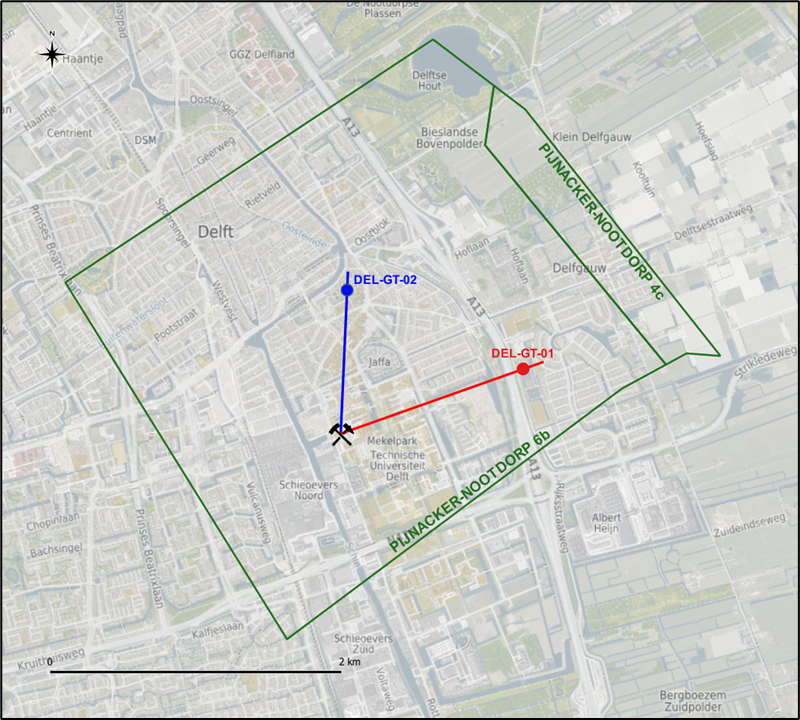Geothermal energy on the TU Delft campus has two goals:
Warming buildings sustainably: In phase 1, the TU Delft buildings will be connected to the geothermal source. In the future (phase 2), other locations within the municipality of Delft will be connected to the source.
Research and innovation: Its necessary to apply the technology on a large scale and cost efficiently. TU Delft is investigating how this can be done. That is why the geothermal wells on the campus are equipped with measuring equipment and are closely monitored, so that the researchers can verify their models and theories in an operating system.
Process
After consultation with the municipality, province, water board and SSM and advice from experts such as TNO and RVO, the Ministry of Economic Affairs has granted an exploration permit. An exploration permit gives permission to search for a geothermal source within a certain area. See also image of the exploration area Pijnacker-Nootdorp 6a which is part of the exploration permit.

Research of the underground has been carried out. These are geological studies, not drilling. With this research, the potential and possibilities of geothermal energy are accurately mapped out. These results have been discussed with the municipality, but also, for example, with the province, the Ministry and the Water Board.
An EIA notification has been submitted to the Ministry of Economic Affairs. This notification note checks whether the project will have no significant adverse effects on the environment. The EIA assessment decision has already been issued, which means that no environmental impact statement needs to be drawn up.
The zoning plan of the municipality of Delft has been irrevocably adopted for the geothermal location on the Rotterdamseweg. Interested parties, including local residents, could submit their views. This plan makes it possible for TU Delft to set up the production location. You can view the draft zoning plan on the website Ruimtelijkekalender.nl.
An environmental permit is required for the above-ground aspects, such as the execution of the two geothermal drillings and the realization of the production facilities. The Ministry of Economic Affairs decides on this, which asks the State Supervision of Mines, the municipality, the province and the water board for advice. Interested parties, including local residents, could submit their views. The environmental permit is currently granted by the Ministry of Economic Affairs.
The consortium will build the geothermal energy installation at the chosen location. First, the drilling is carried out. Only then will we know whether the heat is actually recoverable. For more information about the drilling and planning around this, we refer you to the planning shown at the top of this page.
To extract geothermal energy, even more different permits are needed. This concerns, among other things, a production license and production plan. The Ministry of Economic Affairs decides on this. The ministry asks for advice from experts, such as the State Supervision of Mines, TNO, the Mining Council, the province, the Technical Committee for Soil Movement, municipalities and water boards. Stakeholders, such as local residents, can submit their views on the draft decision for a production plan. After this phase, the above-ground facilities and installations will be placed and connected.
We connect the well to the heat network. The geothermal energy heats the buildings that are connected to the heat network. In the first phase, TU Delft buildings will be heated and in the second phase, in collaboration with Open Warmte Delft, houses and businesses in the Voorhof and Buitenhof districts will be heated with sustainable energy from our own soil.
For the current state of affairs, we refer you to the news items page.